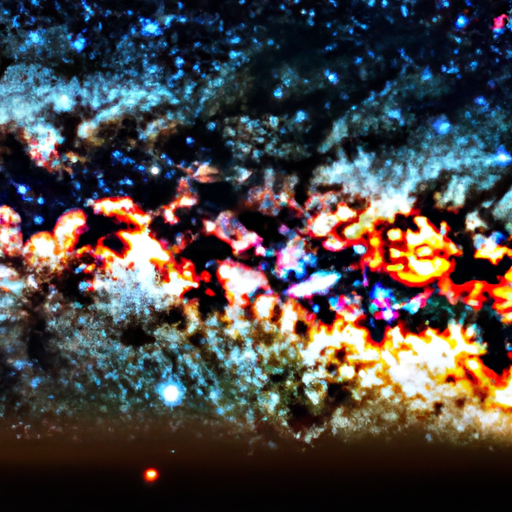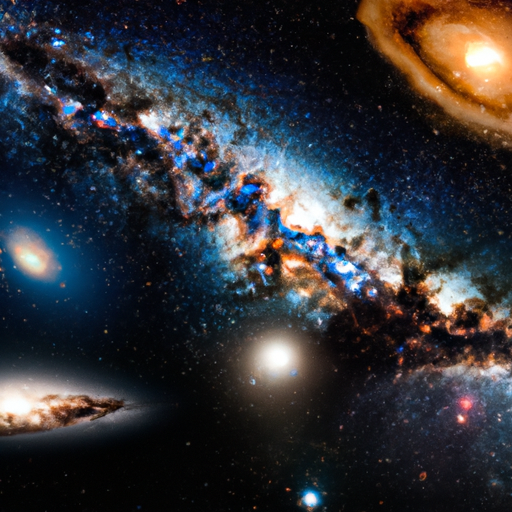Have you ever wondered if it is possible to comprehend anything that happened before the Big Bang? In the quest to understand the origins of the universe, scientists and researchers have been pondering this very question. From exploring the concept of time to delving into theories of parallel universes, this article takes you on a captivating journey to uncover the mysteries of what may have preceded the monumental event that birthed our universe. Get ready to explore the limits of our understanding and push the boundaries of our knowledge.

What is the Big Bang Theory?
Introduction to the Big Bang theory
The Big Bang theory is a widely accepted scientific explanation for the origin and evolution of the universe. According to this theory, the universe began as an extremely hot and dense singularity, approximately 13.8 billion years ago, and has been expanding ever since. This expansion is still ongoing and is believed to have given rise to the vastness of the cosmos we observe today.
Key concepts of the Big Bang theory
There are several key concepts associated with the Big Bang theory that help us understand the early moments and subsequent evolution of the universe. One of these concepts is cosmic microwave background radiation, which is residual radiation from the early stages of the universe and provides crucial evidence supporting the theory. Another important concept is the idea of the expansion of space itself, which not only explains the observed redshift of distant galaxies but also provides insights into the age and size of the universe.
The Limitations of the Big Bang Theory
Inability to explain the ‘before’
While the Big Bang theory offers a comprehensive explanation for the development of the universe from an extremely hot and dense state, it does not provide a satisfactory explanation for what preceded this event. The question of what existed before the Big Bang remains one of the biggest limitations of the theory. As of now, our understanding of the laws of physics breaks down at the singularity, making it challenging to discern what, if anything, came before.
Questions about the origin of the singularity
Another limitation of the Big Bang theory is the mystery surrounding the origin of the initial singularity. The singularity represents a point of infinite density and temperature, defying our current understanding of the laws of physics. Scientists are still grappling with fundamental questions about how the singularity formed and what conditions led to the onset of the Big Bang.
Exploring the Possibility of ‘Before’
Current scientific understanding of time and causality
In an attempt to explore the possibility of what might have existed before the Big Bang, scientists delve into our current scientific understanding of time and causality. Time, as we perceive it, is a linear progression from past to present to future. However, our understanding of time is limited to the framework of the universe as we know it. Exploring the concept of ‘before’ the Big Bang requires contemplating a timelessness or a different nature of time beyond our current understanding.
The concept of a multiverse
One fascinating avenue of exploration is the concept of a multiverse, which postulates that our universe is just one of many universes that exist simultaneously. These parallel universes could have different physical laws and dimensions, opening up the possibility that the singularity from which our universe originated may have arisen from interactions within this multiverse. The multiverse theory offers a potential framework to explore the ‘before’ the Big Bang, although it remains highly speculative at this stage.
Understanding the Nature of Time
The arrow of time
The arrow of time refers to the directional flow of time from past to future, as perceived in our everyday lives. It is closely connected to the increase of entropy in the universe. While the Big Bang theory provides insights into the expansion of the universe, it does not explain why time appears to have a preferred direction. This question remains a subject of ongoing research in physics and cosmology.
Time as a human construct
Another perspective on the nature of time is that it may be a construct of human perception rather than an intrinsic feature of the universe. Some theories suggest that time might emerge as a consequence of quantum processes or as a mathematical tool used to describe physical phenomena. If time is indeed a human construct, it raises further questions about whether the concept of ‘before’ the Big Bang has any meaningful significance outside our subjective understanding.

The Beginning of Time
The Planck Epoch and quantum cosmology
To understand the beginning of time, scientists turn to the Planck Epoch, a period of time approximately 10^-43 seconds after the hypothetical singularity. At this incredibly small scale, the laws of physics as we know them break down, and a theory of quantum gravity, such as string theory, becomes necessary. Quantum cosmology has been one approach in understanding the early moments of the universe when space and time as we know them may not have existed.
Plausible explanations for the origin of the universe
While the exact origin of the universe remains uncertain, there are plausible explanations that have been proposed by scientists. Some theories suggest that our universe could have originated from a previous contracting universe or emerged from a quantum fluctuation in a pre-existing multiverse. These explanations aim to bridge the gap between the ‘before’ and the observable universe, providing potential insights into the origin of the universe.
Quantum Fluctuations and the Multiverse
Introduction to quantum fluctuations
Quantum fluctuations are spontaneous and temporary changes in the energy state of a quantum system. In the context of the early universe, quantum fluctuations could have played a crucial role in triggering the expansion of space during the Big Bang. By the phenomenon of quantum fluctuations, tiny fluctuations in the energy density could have led to the formation of galaxies and cosmic structures observed today.
The concept of parallel universes in the multiverse theory
In the multiverse theory, parallel universes are postulated to exist alongside our own universe. These parallel universes could vary in their physical laws and constants, providing a vast landscape of possibilities. Some theories propose that the singularity from which the Big Bang originated could have been a result of interactions between different parallel universes within the overarching multiverse. Exploring the multiverse theory offers potential insights and possible explanations for the ‘before’ the Big Bang.
The Role of String Theory
Overview of string theory
String theory is a theoretical framework that seeks to unify the fundamental forces of nature and reconcile general relativity with quantum mechanics. It posits that the fundamental building blocks of the universe are tiny, vibrating strings rather than point-like particles. String theory offers a potential avenue to understand the ‘before’ the Big Bang by providing a framework to explore the physics of the singularity and the nature of time at that moment.
String theory’s potential to explain the ‘before’
While string theory remains a highly speculative and mathematically complex field, it offers new possibilities for understanding the ‘before’ the Big Bang. The theory suggests that the singularity and the subsequent expansion of the universe could be part of a larger framework involving extra dimensions and other phenomena beyond our current understanding. String theory’s potential lies in its ability to provide insights into the fundamental nature of the universe and the possibility of resolving the limitations of the Big Bang theory.
Cosmic Inflation and Eternal Inflation
Explanation of cosmic inflation
Cosmic inflation is a hypothesized rapid expansion of space that occurred in the early moments after the Big Bang. It offers a compelling explanation for the uniformity and flatness of the observable universe on large scales. Cosmic inflation proposes that the expansion was driven by an energy field that caused space to undergo exponential growth, leading to the formation of the structures we observe today.
The possibility of eternal inflation and bubble universes
Eternal inflation is a concept within the framework of cosmic inflation, suggesting that the universe’s expansion is not limited to a single event but instead occurs eternally in certain regions. This concept allows for the existence of multiple bubble universes, each with its own set of physical laws and characteristics. Exploring eternal inflation provides potential insights into the conditions preceding the Big Bang and the interconnectedness of various universes within the multiverse.
The Challenge of Observability
Limitations of current observational tools
One of the challenges in exploring the ‘before’ the Big Bang is the limited observational tools available to scientists. As we currently understand it, the universe’s earliest moments are shrouded in the cosmic microwave background radiation, making it difficult to gather direct evidence about what occurred prior to the Big Bang. Advancements in observational technology, such as more sensitive telescopes or new detection methods, may be necessary to overcome these limitations.
Speculations on potential future advancements
While the exact details of future advancements in observational technology remain uncertain, there is reason to be optimistic about our ability to gain further insights into the ‘before’ the Big Bang. Perhaps future breakthroughs will enable us to detect subtle clues hidden in cosmic signatures, gravitational waves, or other phenomena that could shed light on the universe’s origins. As technology evolves, so too does our potential to unlock the mysteries of the ‘before.’
Implications of Understanding the ‘Before’
Philosophical and existential implications
Understanding the ‘before’ the Big Bang carries profound philosophical and existential implications. It challenges our notions of causality, time, and the nature of reality itself. Exploring what preceded the Big Bang invites us to contemplate the limits of our knowledge and confront the mysteries that lie beyond our current understanding. It also raises questions about the nature of existence and our place in the universe.
Impacts on our perception of reality
If we were to gain a deeper understanding of the ‘before’ the Big Bang, it would undoubtedly revolutionize our perception of reality. It could reshape our understanding of the fundamental laws of physics, redefine our understanding of time, and expand our knowledge of the interconnectedness of the cosmos. The potential breakthroughs in this field of study would undoubtedly have far-reaching consequences, both scientifically and philosophically.
In conclusion, while the Big Bang theory has provided us with a comprehensive framework for understanding the origin and evolution of the universe, it falls short in explaining what existed before the Big Bang. Exploring this ‘before’ necessitates delving into the realms of speculative theories such as the multiverse, string theory, and quantum cosmology. Unraveling the mysteries of the ‘before’ holds the promise of transforming our understanding of the universe, time itself, and our place within it.